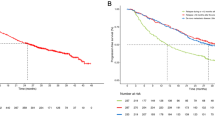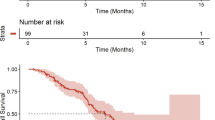Summary
The purpose of this study was to determine the maximum-tolerated dose (MTD), pharmacokinetics and safety profile for two different dosing regimens of barasertib, a selective inhibitor of Aurora B Kinase. In this Phase I trial, patients with advanced solid malignancies were treated with escalating doses of barasertib, administered as either a 48-h continuous infusion or as two 2-h infusions on consecutive days, both every 14 days of a 28-day cycle. Thirty-five patients were treated. The MTDs were 150 mg as a 48-h continuous infusion and 220 mg administered as two 2-h infusions (110 mg/day, days 1, 2, 15 and 16), with neutropenia the dose-limiting toxicity (DLT) of each schedule. Common Terminology Criteria of Adverse Events (CTCAE) grade ≥ 3 neutropenia (with or without fever) occurred in 34 % of patients overall. Other adverse events, many of hematologic or gastrointestinal etiology, were of mild or moderate intensity. No objective tumor responses were observed, although stable disease was observed in 23 % of patients. Systemic exposure to barasertib-hQPA, the more active moiety to which barasertib is converted, was observed by 1 and 6 h into the 2-h and continuous infusion, respectively, and exhibited linear pharmacokinetics. In summary, barasertib was generally well tolerated, with neutropenia the most frequent and dose-limiting toxicity, irrespective of schedule. Future development of barasertib will depend on better definition of its therapeutic index.



Similar content being viewed by others
References
Carmena M, Earnshaw WC (2003) The cellular geography of aurora kinases. Nat Rev Mol Cell Biol 4:842–854
Ducat D, Zheng Y (2004) Aurora kinases in spindle assembly and chromosome segregation. Exp Cell Res 301:60–67
Marumoto T, Honda S, Hara T, Nitta M, Hirota T, Kohmura E, Saya H (2003) Aurora-A kinase maintains the fidelity of early and late mitotic events in HeLa cells. J Biol Chem 278:51786–51795
Ruchaud S, Carmena M, Earnshaw WC (2007) Chromosomal passengers: conducting cell division. Nat Rev Mol Cell Biol 8:798–812
Sasai K, Katayama H, Stenoien DL, Fujii S, Honda R, Kimura M, Okano Y, Tatsuka M, Suzuki F, Nigg EA, Earnshaw WC, Brinkley WR, Sen S (2004) Aurora-C kinase is a novel chromosomal passenger protein that can complement Aurora-B kinase function in mitotic cells. Cell Motil Cytoskeleton 59:249–263
Keen N, Taylor S (2004) Aurora-kinase inhibitors as anticancer agents. Nat Rev Cancer 4:927–936
Andrews PD (2005) Aurora kinases: shining lights on the therapeutic horizon? Oncogene 24:5005–5015
Carvajal RD, Tse A, Schwartz GK (2006) Aurora kinases: new targets for cancer therapy. Clin Cancer Res 12:6869–6875
Warner SL, Munoz RM, Stafford P, Koller E, Hurley LH, Von Hoff DD, Han H (2006) Comparing aurora A and aurora B as molecular targets for growth inhibition of pancreatic cancer cells. Mol Cancer Ther 5:2450–2458
Keen N, Taylor S (2009) Mitotic drivers–inhibitors of the aurora B Kinase. Cancer Metastasis Rev 28:185–195
Gautschi O, Heighway J, Mack PC, Purnell PR, Lara PN Jr, Gandara DR (2008) Aurora kinases as anticancer drug targets. Clin Cancer Res 14:1639–1648
Mortlock AA, Foote KM, Heron NM, Jung FH, Pasquet G, Lohmann JJ, Warin N, Renaud F, De Savi C, Roberts NJ, Johnson T, Dousson CB, Hill GB, Perkins D, Hatter G, Wilkinson RW, Wedge SR, Heaton SP, Odedra R, Keen NJ, Crafter C, Brown E, Thompson K, Brightwell S, Khatri L, Brady MC, Kearney S, McKillop D, Rhead S, Parry T, Green S (2007) Discovery, synthesis, and in vivo activity of a new class of pyrazoloquinazolines as selective inhibitors of aurora B kinase. J Med Chem 50:2213–2224
Keen N, Brown E, Crafter C, Wilkinson R, Wedge S, Foote KM, Mortlock AA, Jung FH, Heron NM, Green S (2005) Biological characterisation of AZD1152, a highly potent and selective inhibitor of aurora kinase activity. Proc AACR-NCI-EORTC: 183 [abstr B220].
Wilkinson RW, Odedra R, Heaton SP, Wedge SR, Keen NJ, Crafter C, Foster JR, Brady MC, Bigley A, Brown E, Byth KF, Barrass NC, Mundt KE, Foote KM, Heron NM, Jung FH, Mortlock AA, Boyle FT, Green S (2007) AZD1152, a selective inhibitor of aurora B kinase, inhibits human tumor xenograft growth by inducing apoptosis. Clin Cancer Res 13:3682–3688
Nair JS, de Stanchina E, Schwartz GK (2009) The topoisomerase I poison CPT-11 enhances the effect of the aurora B kinase inhibitor AZD1152 both in vitro and in vivo. Clin Cancer Res 15:2022–2030
Therasse P, Arbuck SG, Eisenhauer EA, Wanders J, Kaplan RS, Rubinstein L, Verweij J, Van Glabbeke M, van Oosterom AT, Christian MC, Gwyther SG (2000) New guidelines to evaluate the response to treatment in solid tumors. J Natl Cancer Inst 92:205–216
Carpinelli P, Moll J (2008) Aurora kinase inhibitors: identification and preclinical validation of their biomarkers. Expert Opin Ther Targets 12:69–80
Diamond JR, Bastos BR, Hansen RJ, Gustafson DL, Eckhardt SG, Kwak EL, Pandya SS, Fletcher GC, Pitts TM, Kulikowski GN, Morrow M, Arnott J, Bray MR, Sidor C, Messersmith W, Shapiro GI (2011) Phase I safety, pharmacokinetic, and pharmacodynamic study of ENMD-2076, a novel angiogenic and aurora kinase inhibitor, in patients with advanced solid tumors. Clin Cancer Res 17:849–860
Boss DS, Witteveen PO, van der Sar J, Lolkema MP, Voest EE, Stockman PK, Ataman O, Wilson D, Das S, Schellens JH (2011) Clinical evaluation of AZD1152, an i.v. inhibitor of aurora B kinase, in patients with solid malignant tumors. Ann Oncol 22:431–437
Rubin E, Shapiro G, Stein M, Watson P, Bergstrom D, Xiao A, Clark J, Freedman S, Eder J (2006) A phase 1 clinical and pharmacokinetic trial of the aurora kinase (AK) inhibitor MK-0457 in cancer patients. J Clin Oncol 24 (June 20 Suppl): A3009 [abstr]
Traynor AM, Hewitt M, Liu G, Flaherty KT, Clark J, Freedman SJ, Scott BB, Leighton AM, Watson PA, Zhao B, O’Dwyer PJ, Wilding G (2011) Phase I dose escalation study of MK-0457, a novel aurora kinase inhibitor, in adult patients with advanced solid tumors. Cancer Chemother Pharmacol 67:305–314
Steeghs N, Eskens FA, Gelderblom H, Verweij J, Nortier JW, Ouwerkerk J, van Noort C, Mariani M, Spinelli R, Carpinelli P, Laffranchi B, de Jonge MJ (2009) Phase I pharmacokinetic and pharmacodynamic study of the aurora kinase inhibitor danusertib in patients with advanced or metastatic solid tumors. J Clin Oncol 27:5094–5101
Cohen RB, Jones SF, Aggarwal C, von Mehren M, Cheng J, Spigel DR, Greco FA, Mariani M, Rocchetti M, Ceruti R, Comis S, Laffranchi B, Moll J, Burris HA (2009) A phase I dose-escalation study of danusertib (PHA-739358) administered as a 24-hour infusion with and without granulocyte colony-stimulating factor in a 14-day cycle in patients with advanced solid tumors. Clin Cancer Res 15:6694–6701
Schoffski P, Jones SF, Dumez H, Infante JR, Van Mieghem E, Fowst C, Gerletti P, Xu H, Jakubczak JL, English PA, Pierce KJ, Burris HA (2011) Phase I, open-label, multicentre, dose-escalation, pharmacokinetic and pharmacodynamic trial of the oral aurora kinase inhibitor PF-03814735 in advanced solid tumours. Eur J Cancer 47:2256–2264
Tsuboi K, Yokozawa T, Sakura T, Watanabe T, Fujisawa S, Yamauchi T, Uike N, Ando K, Kihara R, Tobinai K, Asou H, Hotta T, Miyawaki S (2011) A Phase I study to assess the safety, pharmacokinetics and efficacy of barasertib (AZD1152), an Aurora B kinase inhibitor, in Japanese patients with advanced acute myeloid leukemia. Leuk Res 35: 1384–9
Löwenberg B, Muus P, Ossenkoppele G, Rousselot P, Cahn JY, Ifrah N, Martinelli G, Amadori S, Berman E, Sonneveld P, Jongen-Lavrencic M, Rigaudeau S, Stockman P, Goudie A, Faderl S, Jabbour E, Kantarjian H (2011) Phase I/II study to assess the safety, efficacy, and pharmacokinetics of barasertib (AZD1152) in patients with advanced acute myeloid leukemia. Blood 118:6030–6036
Smith SL, Bowers NL, Betticher DC, Gautschi O, Ratschiller D, Hhoban PR, Booton R, Santibanez-Koref MF, Heighway J (2005) Overexpression of aurora B kinase (AURKB) in primary non-small cell lung carcinoma is frequent, generally driven by one allele, and correlates with the level of genetic instability. Br J Cancer 93:719–729
Vischioni B, Oudejans JJ, Vos W, Rodriguez JA, Giaccone G (2006) Frequent overexpression of aurora B kinase, a novel drug target, in non-small cell lung carcinoma patients. Mol Cancer Ther 5:2905–2913
Boss DS, Beijnen JH, Schellens JH (2009) Clinical experience with aurora kinase inhibitors: a review. Oncologist 14:780–793
Azzariti A, Bocci G, Porcelli L, Fioravanti A, Sini P, Simone GM, Quatrale AE, Chiarappa P, Mangia A, Sebastian S, Del Bufalo D, Del Tacca M, Paradiso A (2011) Aurora B kinase inhibitor AZD1152: determinants of action and ability to enhance chemotherapeutics effectiveness in pancreatic and colon cancer. Br J Cancer 104:769–780
Acknowledgments
We thank Merran Macpherson of AstraZeneca UK Ltd. Clinical Pharmacology Science, for assistance with interpretation of pharmacokinetic assessments. We also thank the study teams at Memorial Sloan-Kettering Cancer Center and the Dana-Farber Cancer Institute, including Andrew Wolanski NP, Tracy Bell RN and Sarah Scofield. Editorial assistance was provided by Dr. Zoё van Helmond from Mudskipper Bioscience, funded by AstraZeneca.
Conflict of interest
P.K.S., O.A., D.W. and S.D. are employees of AstraZeneca. G.K.S. and G.I.S. have consulted for AstraZeneca. The other authors declare that they have no conflict of interest.
Author information
Authors and Affiliations
Corresponding authors
Electronic supplementary material
Below is the link to the electronic supplementary material.
Supplementary Figure 1
Absolute neutrophil count over time in a patient who received barasertib on both schedules with growth factor support. A 65-year old with mesothelioma, enrolled to the 225 mg dose level of Schedule A experienced dose limiting toxicity with grade 4 neutropenia lasting >3 days after the first 48-h infusion, necessitating a delay in cycle 1, day 15 dosing, and prompting a reduction to 150 mg for the second infusion. Although the nadir after the second infusion was improved, she initiated cycle 2 with a grade 1 ANC, and again suffered prolonged grade 4 neutropenia after that infusion, prompting a delay in the day 15 infusion. At that time, a chest wall mass was decreasing in size. Growth factor support was not routinely used during the study. Nonetheless, a decision was made to maintain the 150 mg dose level with pegfilgrastim, which was administered 24 h after the end of each subsequent 48-h infusion. She received her first dose of pegfilgrastim on day 58, which ameliorated the degree of neutropenia save for the nadir that occurred on day 91. She did not receive pegfilgrastim prior to the nadir that occurred on day 119. With the use of pegfilgrastim, neutropenic nadirs were routinely between ~1,200–3,200, and no further dosing delays were required. After the first infusion of the sixth cycle, a port-a-cath occlusion occurred; for this reason, as well as for convenience, she was permitted to switch to 2-h infusions, and received 75 mg over 2 h on consecutive days every other week thereafter (i.e. similar cumulative dose) beginning with day 15 of cycle 6. Pegfilgrastim was administered 24 h after the end of each second 2-h infusion. Overall, nadir neutrophil counts were substantially higher on this schedule, ranging from ~5,200–10,800. Thick gray bars represent 48-h infusions; thin gray bars represent consecutive day 2-h infusions. (TIFF 2783 kb)
Rights and permissions
About this article
Cite this article
Schwartz, G.K., Carvajal, R.D., Midgley, R. et al. Phase I study of barasertib (AZD1152), a selective inhibitor of Aurora B kinase, in patients with advanced solid tumors. Invest New Drugs 31, 370–380 (2013). https://doi.org/10.1007/s10637-012-9825-7
Received:
Accepted:
Published:
Issue Date:
DOI: https://doi.org/10.1007/s10637-012-9825-7




